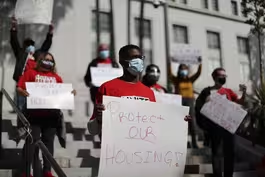
The state of abortion access in the U.S. a year post-Roe
Clip: 6/24/2023 | 7m 56sVideo has Closed Captions
The state of abortion access in America a year after Roe’s reversal
A year ago today, the Supreme Court overturned Roe v. Wade and erased the constitutional right to seek an abortion. It was a tectonic shift that left each state to decide whether abortion would be legal within its borders. Now, as the 2024 election looms, abortion is shaping up to be a key issue. Ali Rogin reports on the current state of abortion access in America.
Problems playing video? | Closed Captioning Feedback
Problems playing video? | Closed Captioning Feedback
Major corporate funding for the PBS News Hour is provided by BDO, BNSF, Consumer Cellular, American Cruise Lines, and Raymond James. Funding for the PBS NewsHour Weekend is provided by...

The state of abortion access in the U.S. a year post-Roe
Clip: 6/24/2023 | 7m 56sVideo has Closed Captions
A year ago today, the Supreme Court overturned Roe v. Wade and erased the constitutional right to seek an abortion. It was a tectonic shift that left each state to decide whether abortion would be legal within its borders. Now, as the 2024 election looms, abortion is shaping up to be a key issue. Ali Rogin reports on the current state of abortion access in America.
Problems playing video? | Closed Captioning Feedback
How to Watch PBS News Hour
PBS News Hour is available to stream on pbs.org and the free PBS App, available on iPhone, Apple TV, Android TV, Android smartphones, Amazon Fire TV, Amazon Fire Tablet, Roku, Samsung Smart TV, and Vizio.
Providing Support for PBS.org
Learn Moreabout PBS online sponsorshipJOHN YANG: It was a year ago today that the Supreme Court overturned Roe v. Wade, erasing the nearly half century old constitutional right to seek an abortion.
It was a tectonic shift, leaving it up to each state to decide whether abortions would be legal within its borders.
Now, as the 2024 election looms, abortion is shaping up to be a key issue.
In Charlotte, North Carolina, vice President Kamala Harris told abortion rights supporters today that their cause was not unlike the civil rights movement of the 1960s.
KAMALA HARRIS, U.S. Vice President: We all of us are now called upon to advance the promise of freedom, including the freedom of every woman to make decisions about her own body, not the government, telling her what to do.
JOHN YANG: In Washington, DC her predecessor, former Vice President Mike Pence, spoke at antiabortion rally at the Lincoln Memorial.
He called for a nationwide ban on abortion.
MIKE PENCE, Former U.S. Vice President: Gather here knowing that we've not come to the end of this cause.
We will never rest and never relent until we restore the sanctity of life to the center of American law in every state in the land.
JOHN YANG: Ali Rogin looks at the current state of abortion access in America.
ALI ROGIN: When the ruling came down, the reactions were immediate and passionate supporters of abortion rights mourned.
WOMAN: I was disgusted because abortion is health care.
I mean, you can die giving birth.
We don't even have universal health care.
Women are going to go into debt giving birth, and it's a health care issue.
ALI ROGIN: Opponents celebrated.
WOMAN: This has been by far the best way of my life.
It just -- there's now hope for the women and children who have been hurt and killed by abortion.
ALI ROGIN: Following the Dobbs decision, abortion bans in 13 states immediately took effect, restricting access to abortion.
Some states, like Texas, banned abortions with almost no exceptions, and the penalties are severe.
Under Senate Bill 8, anyone caught helping someone access an abortion can be sued, and the state trigger laws criminalize doctors performing the procedure.
They risk losing their medical license, $100,000 fine and prison time.
One study revealed that the average travel time for an abortion increased from 28 minutes in 2021 to over an hour and a half in 2022.
A separate study found that in the first 100 days post-Roe, 66 clinics across 15 states were forced to stop performing abortions.
But the clinics that stayed open saw an influx of out of state patients.
DR. Gabrielle Goodrick, Family Physician, Camelback Family Planning: We had a woman travel from Oklahoma.
We've had women travel from Louisiana and Texas coming here.
If were closed, where would they go?
ALI ROGIN: One case crystallized the new reality post-Roe that of a ten year old rape victim from Ohio who had to travel to Indiana for an abortion.
Mary Ziegler is a legal historian and constitutional law professor at the University of California.
MARY ZIEGLER, University of California, Davis School of Law: The idea of a ten year old child being sexually assaulted and then denied access to abortion seemed to, I think, many conservatives, to be kind of just a scare tactic, not something that we would see in real life.
And the fact that it happened so quickly, I think, was a reminder that the America we live in now is very different than the one before the Supreme Court reversed Roe v. Wade.
JOE BIDEN, U.S. President: These are the laws that not only put women's lives at risk.
These are the laws that will cost lives.
What we're witnessing is a giant step backwards in much of our country.
ALI ROGIN: As pressure mounted, President Biden signed executive orders to help preserve access to abortion, medication and emergency contraception.
But their impact was limited, says Tracy Weitz, the director of the Center on Health, Risk and Society at American University.
TRACY WEITZ, American University: Executive actions are incredibly important.
They're symbolically important, and they make small differences.
But only Congress and state legislatures can secure the right to abortion for people in the United States.
MARY ZIEGLER: President Biden can't tell the Supreme Court how to interpret the Constitution, and the courts themselves, especially the U.S. Supreme Court is very conservative now, and so I think that's made the Biden administration cautious and potentially with reason.
ALI ROGIN: Grassroots activists and abortion rights groups came up with ways to get around the new laws.
One California doctor proposed a floating abortion clinic in the Gulf of Mexico.
Planned Parenthood launched a mobile abortion unit in the Midwest.
And the healthcare company, Just the Pill, which delivers abortion medication, launched a mobile clinic in Colorado.
It parks near the border with states where abortion access is restricted to let visitors access pills.
But access to one of those pills came under threat in April.
A federal judge in Texas ruled that the drug mifapristone had been improperly cleared for use by the FDA 20 years earlier.
For now, providers can still prescribe mifapristone as they wait for a decision from a federal appeals court.
Meanwhile, abortion began playing a major role at the ballot box.
Kansas voters were the first to weigh in on post-Roe policy last August.
They rejected an amendment to the state's constitution that would have said it did not guarantee the right to an abortion.
Critics said it was meant to curtail abortion rights in a state where the procedure was legal until 22 weeks.
MARY ZIEGLER: Kansas is a conservative state that generally elects Republicans.
America is so divided and so partisan that it was the first time we got a chance to see what voters would do if presented the abortion issue directly, rather than asked, do you want a Republican or a Democrat?
This is just a straight up and down.
What do you think about abortion rights in your state?
And what we learned from that was pretty revealing.
ALI ROGIN: Abortion remained a major issue throughout the midterm elections.
Voters in California, Michigan, Vermont, and Kentucky enshrined abortion protections in their state constitutions.
In six states, new abortion bans have been blocked by state and county judges.
And the debates over abortion access aren't falling entirely on partisan lines.
In South Carolina, five women senators, including three Republicans, formed a filibuster to stop a six-week abortion ban, but they failed to block it, and the bill became law in May.
SEN. MIA MCLOED, South Carolina: It's so disheartening to think that 41 men in this body can make decisions for women and girls that will impact women and girls across our state for generations to come.
ALI ROGIN: Today, abortions at any stage are still banned in 14 states.
Georgia does not allow abortion after six weeks, Nebraska after 12 weeks, Arizona and Florida after 15 weeks, Utah after 18 weeks, and North Carolina after 20.
TRACY WEITZ: The vast majority of abortions in the United States are to people who face the structural inequities of our country.
That is, people who are low income and people of color.
And that's because of long standing inequalities in access to health care.
And those are also the people who struggle with having to travel, with having to take time off, with having to find additional resource, financial resources, to get to a state that could be thousands of miles away in order to have an abortion.
ALI ROGIN: Now, a year after Roe v. Wade was dismantled, the United States is a patchwork of abortion laws.
MARY ZIEGLER: I would describe the landscape when it comes to abortion access in America today as chaotic and fluid.
And chaos means confusion for patients, right?
It means confusion for doctors.
The harder it is to figure out where law and politics are going, the more frightened people become.
ALI ROGIN: And as states decide what happens next, many women are forced to navigate that chaos.
For PBS News Weekend, I'm Ali Rogin.
Evictions mount as rising rents squeeze low-income Americans
Video has Closed Captions
Clip: 6/24/2023 | 5m 46s | Evictions skyrocket as rising rents squeeze low-income Americans (5m 46s)
What to know about the turmoil between Russia and Wagner
Video has Closed Captions
Clip: 6/24/2023 | 8m 29s | What to know about the turmoil in Russia as Wagner halts its advance on Moscow (8m 29s)
Providing Support for PBS.org
Learn Moreabout PBS online sponsorship
- News and Public Affairs

FRONTLINE is investigative journalism that questions, explains and changes our world.

- News and Public Affairs

Amanpour and Company features conversations with leaders and decision makers.












Support for PBS provided by:
Major corporate funding for the PBS News Hour is provided by BDO, BNSF, Consumer Cellular, American Cruise Lines, and Raymond James. Funding for the PBS NewsHour Weekend is provided by...

